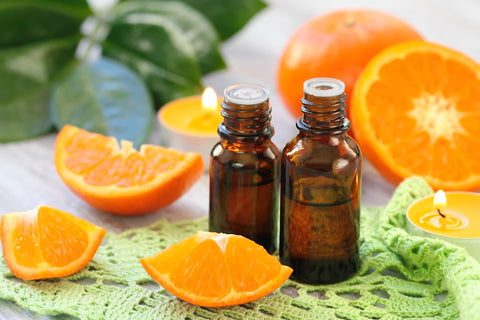The essential oils of the orange are taken from the bright orange peel. This outer peel of citrus fruits is called the flavedo and it is covered with tiny glands. Each gland contains one drop of essential oil. To extract the organic oil, the peel must be physically broken open. The main components of orange oil are somewhat different between a sweet orange and a bitter orange oil.
Expression Or Cold Pressing
Expression refers to the process of slowly breaking down orange peel under mechanical pressure to release the oils from the glands of the peel. This process uses ecuelle a piquer, or an apparatus designed to extract oils from fruit rinds.
It began in France as a bowl lined with needles to prick the fruits peel, and a funnel to collect the released oils. It has been modernized to accommodate commercial practices, but uses the same principles of poking and agitating the rind.
Bitter orange oils are obtained via cold pressing. Cold pressed means that the oil was expressed at a low temperature. The low temperature preserves the volatile oil, which provides the rich scent of the plant. The best yield from orange rinds appears to come when the peel has been dried first.
The oil that is collected will range in composition, depending on the how mature the plant was and which variety of orange was used. All varieties of orange produce volatile oils that are very rich in the monoterpene hydrocarbon limonene. The flavor of the oil comes from its sesquiterpene hydrocarbons. Hesperidin and other flavonoids are abundant in the peels, but they break down quickly during processing.
Distillation Extraction
Distillation extraction means exposing a plant to water or steam to break down the plant material and release the essential oil. The oils are cooled and condensed for collection. Distillation is used for orange extraction, using either the whole fruit or the peel.
Steam distilled orange peel oil will not contain the waxy residue that a cold-pressed oil would contain. This makes them less likely to clog oil diffusers, stain fabric and, as they are less biologically active, extends the shelf life. Distillation also allows the fucouramins to be removed from orange oils.
Furocoumarins have been found to be photocarcinogenic, which means that when these compounds are exposed to light, they can cause mutations in cells that lead to cancer. This helps with leave-on skin products that might be scented with orange oil. The toxicity is not observed in wash away products, but there is some evidence that drinking orange juice regularly causes the photosensitivity that can lead to skin cancer.
Looking for 100% chemical-free, all-natural nourishing face and body oils? Check out Earth & Elm Nourishing Face Oil and Earth & Elm Nourishing Body Oil. Subscribe to our Trusted Health Club newsletter for more information about natural living tips, natural health, oral care, skincare, body care and foot care. If you are looking for more health resources check out the Trusted Health Resources list.
Reviewed By:
Founder Ray Spotts has a passion for all things natural and has made a life study of nature as it relates to health and well-being. Ray became a forerunner bringing products to market that are extraordinarily effective and free from potentially harmful chemicals and additives. For this reason Ray formed Trusted Health Products, a company you can trust for clean, effective, and healthy products. Ray is an organic gardener, likes fishing, hiking, and teaching and mentoring people to start new businesses. You can get his book for free, “How To Succeed In Business Based On God’s Word,” at www.rayspotts.com.




